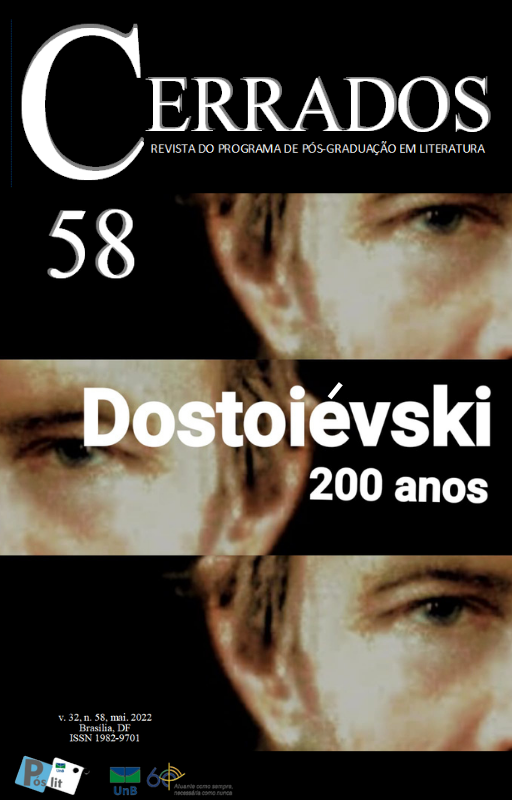A Gentle Creature as an Interpretation of Dostoevsky’s Creative Method and Humanistic Ideal
DOI:
https://doi.org/10.26512/cerrados.v31i58.42221Keywords:
Dostoevsky, life, death, immortality, BakhtinAbstract
The essay aims at identifying and describing the artistic specificity of Dostoevsky’s aesthetic ideal through the analysis of the literary text, A Gentle Creature, in order to define the author’s positions in relation to “true life” and death. The role and function of the story, which is part of the Diary of a Writer of 1876, will be outlined, both synchronically and diachronically, in relation to the spiritual and cultural context of the time.
Downloads
References
BACHTIN, M.M. Problemi dell’opera di Dostoevskij (1929). A cura di DE MICHIEL M. e PONZIO A. Bari: Edizioni dal Sud, 2018.
DOSTOEVSKIJ, F. M. Diario di uno scrittore. Firenze: Sansoni, 1963.
DOSTOEVSKIJ, F. M. Memorie dal sottosuolo. Milano: Mondadori, 2017.
DOSTOEVSKIJ, F. M. La mite. Racconto fantastico. A cura di Vitale S. Milano: Adelphi, 2018.
FERRAZZI, M. La povest’ russa fra evo antico ed evo moderno. IN: Europa Orientalis. 9, 1990, pp. 9-21.
HUGO, V. L’ultimo giorno di un condannato a morte. Milano: Feltrinelli, 2016.
IMPOSTI, G. Inattendibilità e paradosso del narratore in Memorie dal sottosuolo di Dostoevskij. IN: CICCARINI M., MARCIALIS N., ZIFFER G. (a cura di), Kesarevo Kesarju. Scritti in onore di Cesare G. De Michelis. Firenze: FUP, 2014, pp. 229-239.
KASATKINA, T. Dostoevskij. Il sacro nel profano. Milano: Rizzoli, 2020.
KULCZYCKA-SALONI, JA. Dostoevskij: nuovi problemi, nuove forme. IN: GRACIOTTI, S. (a cura di), Dostoevskij nella coscienza d’oggi. Firenze: Sansoni, pp. 17-26.
PONZIO, A. Dialogo e polifonia in Dostoevskij: come è stato frainteso il pensiero di Bachtin. IN: BACHTIN, M. M. Problemi dell’opera di Dostoevskij (1929). A cura di De Michiel, M. e Ponzio, A. Bari: Edizioni dal Sud, 2018, pp. 5-30.
RIASANOVSKY, N.V. Storia della Russia. Milano: Bombiani, 2005.
SEDAKOVA, O.A. O pokajanii i raskajanii. IN: Kifa, n. 12 (198), ottobre 2015, pp.1,4.
ŠKLOVSKIJ, V. Teoria della prosa. Torino: Einaudi, 1976.
TUNIMANOV, V.A. Publicistika Dostoevskogo. “Dnevnik pisatelja”. IN: (pod. red.)
Downloads
Published
How to Cite
Issue
Section
License
Copyright (c) 2022 Revista Cerrados

This work is licensed under a Creative Commons Attribution 4.0 International License.
Proibida a reprodução parcial ou integral desta obra, por qualquer meio eletrônico, mecânico, inclusive por processo xerográfico, sem permissão expressa do editor (Lei n. 9.610 de 19/2/1998 )



